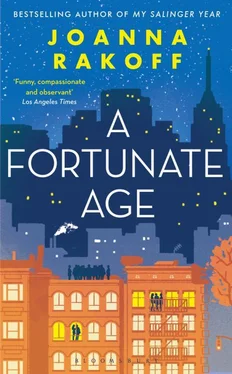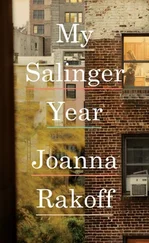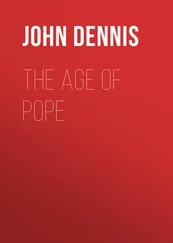“So then who is the guy? How do you find him?” Sadie had asked when Emily explained this theory to her. “I don’t know,” Emily admitted, feeling her face grow hot, her anger rise. “But he’s not going to be the person you’d expect. And definitely not an actor .” This was when she still thought she was going to Broadway. She’d felt bold and brash and happy alone. A month later, she’d met Curtis. Which was how it always happened, wasn’t it? You had to be completely satisfied with yourself, certain that you could live forever alone—she saw herself like Katharine Hepburn, in slacks and turtleneck, rattling around her cluttered apartment—before you could attract others. But once you settled on someone—settled in with someone—you lost the contentment and confidence that attracted him in the first place. You began worrying about his happiness, and his goals and wants, so that you internalized them, and your own happiness and goals and wants were banished to some dark and musty part of yourself. She’d seen it happen with Lil, who had clearly dropped out of Columbia so she wouldn’t be a threat to Tuck’s precious intellect, and with Beth, who always seemed exhausted lately, running herself ragged teaching adjunct, still—at NYU, but still —and writing for anyone who would have her (Will kept telling her to give up the teaching, but she couldn’t let it go, the idea of herself as an academic), her dissertation still unfinished, and schlepping Sam to soccer and gymnastics and swimming, as if she could make up for not being his actual, biological mother by sheer calories spent. Emily could barely stand to see either of them. They were, she supposed, the Ghosts of Marriage Future, with their glib, superficial chatter; they seemed positively terrified that she might engage them in some sort of real conversation and pierce the fragile bubble of their unions. And yet— and yet —she was jealous, stupidly, embarrassingly jealous of their clichéd resentments (“Tuck stayed out until four last night”) and their domestic squabbles (“Will just won’t do the dishes”) and even their boredom (“I feel like we have nothing to talk about”). Marriage, with all its flaws, had to be better than her current state, a sort of limbo.
There was Sadie, too, of course. She and Ed seemed happy—though Emily still couldn’t believe that Sadie had ended up with someone other than Tal—and even happier now that they had Jack, who at two weeks struck Emily as preternaturally alert, with his enormous blue eyes, and vast, drooping cheeks. But then, they had things better than the others, in a way. They were— Why, why , Emily often wondered—the sort of people for whom everything came easily. In April, Sadie’s ancient aunt had died, leaving Sadie her apartment in the old union co-ops on Grand, unnervingly close to the Williamsburg Bridge. They’d moved in just a few weeks back, right before Jack was born. She’d visited them the day before, in the new apartment—boxy but pleasant—and been struck by the effortlessness of their interactions, Sadie resting against Ed on her old velvet couch, Jack sleeping on her lap. Was it because they were still sort of new? Or was it simply that they were right ? Regardless, she was dismayed to find that it made her a little sick. “I think you’re the most calm new mother I’ve ever seen,” she told Sadie, trying not to grit her teeth.
“Well, you should come back next week.” Sadie had laughed, giving Ed a wry smile. “I might not be so calm.”
“I’m going to Toronto,” Ed explained. “The film festival.”
“Oh, right!” Emily had completely forgotten about this. “So exciting!”
“Yeah, well, we’ll see what people think.”
“People are going to think it’s brilliant,” said Sadie.
“Are you nervous about being alone?” Emily asked her.
“Mmm-hmmm,” said Sadie.
“You don’t want to go?”
“I do,” said Sadie. “I was planning on going. But what would I do with Jack. He has to nurse every five minutes. I don’t know if I could leave him with a sitter.” She smiled down at him. “He’s so little. And how would we even find a sitter?” Leaning over, she kissed Ed’s cheek, a gesture so intimate that Emily had to look away. “And I think it’s probably better for Ed to go alone. He has to network .”
When Jack woke, Sadie handed him to Emily. She’d been startled by the warm heft of him—his breath hot on her shoulder, his eyes meeting her own—and she’d walked out the door limp with yearning, though she didn’t understand why. She’d never particularly wanted a baby. Or even marriage. Was it the world, changing around her? Everyone seemed to be getting married these days, and everyone in Williamsburg seemed to be having babies. Or was it all, yes, because she had nothing, nothing ?
Meanwhile, Curtis was on the verge of having everything. As was, of course, Dave, which was particularly irritating, since he was, by far, the laziest person she knew. The band’s first album, recorded over a year ago, would finally be coming out the following week. There had been some uncertainty eight-odd months back, when their label was bought by another, larger label, which fired the original staff (who used their buyout cash to start another label). The new people—the marketing execs, the producers, the other nameless, uncategorizable middle managers with whom Curtis and Dave and the other guys met in glassy midtown conference rooms—didn’t know exactly what to do with them and admitted as much. For a while there was talk of dropping them (“The market’s saturated with this Elliott Smith kind of stuff”); for a while there was radio silence—no word, nothing, no calls answered; but finally, in the end, things had turned out surprisingly, strangely well. In May, a younger producer actually listened to the Lincoln recordings—during all those months of grumbling and silence, no one, it turned out, had bothered to listen to the band’s stuff—and decided the band had a “unique sound” and “next-big-thing potential,” terms that made Curtis more nervous than elated. “Now is when I’d really like a beer,” he said after hanging up the phone with the producer. “So have a beer,” Emily said. “I can’t,” he told her, with a flash of anger. “You know I can’t.”
But then money—not huge amounts of it, but money nonetheless—began to arrive, money for them to live on while they mixed the album. Money to hire a famous, crazy photographer to take moody, retro shots for the album cover; money to plaster the city—or at least the East Village—with posters of that cover; money to send them on tour (they left on Thursday; Emily had been trying not to think about it); money to pay a shrill publicist with streaked blonde hair and a Five Towns twang, who called almost daily with reports of her success on their behalf: a piece in Time Out , a piece in New York to coincide with their show at Hammerstein Ballroom (back of the book, but still); reviews here, interviews there, Saturday Night Live was maybe interested. “Big things are HA-pen-ING ,” she liked to say. And then the biggest: an off-puttingly cool magazine—its text printed in mod sans serif, its models clad in rags—selected them as one of its “five bands to watch.” Or something like that. The issue would be out on Tuesday—Curtis had been promised an advance copy, which never arrived—and it was possible, the publicist kept bleating, that the band would be on the cover (“They’ve told me the cover is a POS-si-BIL-ity. Fingers crossed!”). A couple months back, Curtis and Dave and the others had been styled and photographed and interviewed. Afterward, they’d talked about how silly it all was, but Emily could see they all loved it. All except Curtis, who seemed even more fidgety and quiet than usual. When Emily asked him about it—Was he not excited? Worried? Anxious?—he shrugged his shoulders, which were narrow, and blinked behind his round glasses. “I don’t really want to talk about it,” he told her. “I’m trying not to think too much about it. I don’t want to be disappointed. This could all turn out to be nothing.”
Читать дальше












